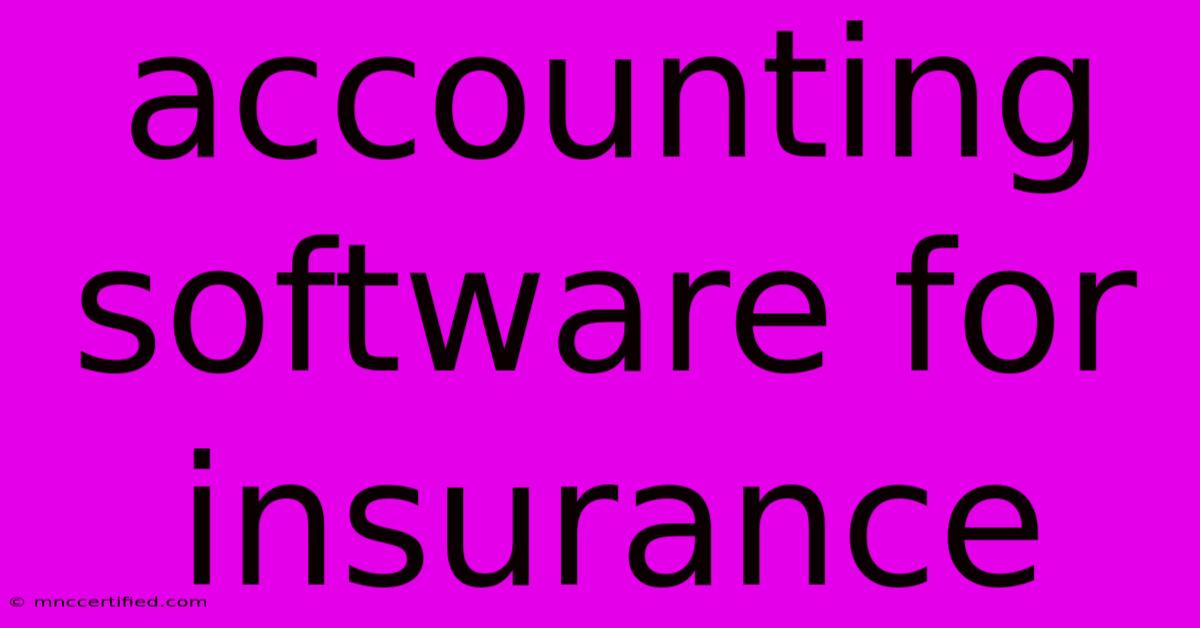Accounting Software For Insurance

Table of Contents
Accounting Software for Insurance: Streamlining Your Business
The insurance industry is complex, demanding meticulous record-keeping and financial management. Choosing the right accounting software can significantly impact efficiency, accuracy, and profitability. This article explores the key features to look for in accounting software specifically designed for insurance businesses, highlighting the benefits and considerations for making the right choice.
Why Specialized Insurance Accounting Software Matters
Generic accounting software often lacks the specific functionalities needed for the nuances of insurance accounting. Features like policy management, claims processing tracking, and commission calculations are crucial for insurance businesses but may be absent or poorly implemented in standard accounting packages. Using specialized software offers several advantages:
- Improved Accuracy: Automated processes reduce manual data entry, minimizing human error in crucial calculations and reporting.
- Enhanced Efficiency: Streamlined workflows for tasks like premium billing, commission payouts, and claims processing save valuable time and resources.
- Better Compliance: Software designed for the insurance industry often incorporates features to ensure compliance with relevant regulations and reporting requirements.
- Increased Profitability: By optimizing financial processes, you can improve cash flow, reduce operational costs, and boost your bottom line.
- Improved Reporting and Analytics: Gain deeper insights into your business performance with customized reports and dashboards tailored to the insurance industry.
Key Features of Effective Insurance Accounting Software
Choosing the right software involves carefully considering specific features. Here are some essential functionalities to look for:
1. Policy Management:
- Automated Policy Creation and Renewal: Streamline the process of generating new policies and renewing existing ones.
- Centralized Policy Database: Maintain a comprehensive, easily searchable database of all active and inactive policies.
- Policy Tracking and Reporting: Generate reports on policy status, renewal dates, and other key metrics.
2. Claims Processing:
- Automated Claim Tracking: Monitor the status of claims from inception to settlement.
- Integration with other systems: Seamlessly integrate with your existing claims management systems.
- Detailed Reporting on Claims: Generate comprehensive reports on claims costs, frequency, and types.
3. Commission Management:
- Automated Commission Calculations: Accurately calculate and track agent commissions based on various factors.
- Flexible Commission Structures: Accommodate diverse commission structures and payment schedules.
- Automated Commission Payments: Streamline the process of paying agents their commissions.
4. Financial Reporting and Analytics:
- Customized Reporting Options: Generate reports tailored to your specific needs and regulatory requirements.
- Real-time Financial Dashboards: Access up-to-the-minute insights into your business's financial performance.
- Data Visualization Tools: Effectively visualize your financial data to identify trends and opportunities.
5. Integration with Other Systems:
- Seamless integration with CRM systems: Integrate with your customer relationship management (CRM) software for a holistic view of your customer interactions.
- Integration with other insurance-specific platforms: Ensure compatibility with other insurance-related software and services you utilize.
Choosing the Right Software for Your Insurance Business
The best accounting software for your insurance business will depend on factors like your company size, type of insurance offered, budget, and specific needs. Consider the following:
- Cloud-based vs. On-premise: Cloud-based solutions offer scalability, accessibility, and cost-effectiveness, while on-premise solutions provide greater control over data security.
- Scalability: Choose software that can grow with your business, accommodating increasing volumes of data and users.
- Customer Support: Ensure that the vendor offers reliable and responsive customer support.
- Cost: Balance the cost of the software with its features and benefits.
By carefully considering these factors and the features highlighted above, you can choose accounting software that will significantly improve the efficiency and profitability of your insurance business. Investing in the right technology is a crucial step towards long-term success in this competitive industry. Remember to thoroughly research different providers and potentially request demos before committing to a specific solution. This ensures the software aligns perfectly with your operational needs and enhances your business processes.

Thank you for visiting our website wich cover about Accounting Software For Insurance. We hope the information provided has been useful to you. Feel free to contact us if you have any questions or need further assistance. See you next time and dont miss to bookmark.
Featured Posts
-
Seaview Insurance Company Payment
Nov 19, 2024
-
Minute Maid Park Renamed Daikin Field
Nov 19, 2024
-
Hudson Insurance Tillamook Oregon
Nov 19, 2024
-
3rd T20 I Australia Defeats Pakistan
Nov 19, 2024
-
Croatia Vs Portugal Bet Builder Tips
Nov 19, 2024